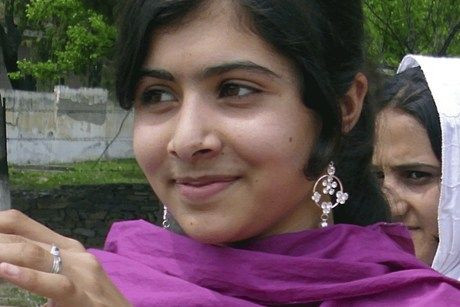Malala Yousufzai: Pakistan's Joan Of Arc
Malala Yousufzai: Pakistan's Joan Of Arc

With her beautiful, angelic face and soulful eyes, Malala Yousufzai, the 14-year-old Pakistani girl who was shot by Taliban gunmen for advocating women’s education and criticizing the Islamic militants in her native Swat Valley, has become a global icon.
Pakistan is a troubled land where violence is so endemic that an endless stream of harrowing reports detailing massacres, suicide bombings, sectarian murders, 'honor' killings and other atrocities barely register to a public benumbed by these daily horrors.
However, the shooting of a helpless, innocent, unarmed young girl (more child than woman) who was on her way home from school has struck a nerve in the populace.
Indeed, we have witnessed (and continue to witness) massive protests, demonstrations and prayer vigils on behalf of Malala. The public's revulsion over the horrific attack has even encompassed some Islamic militant groups who have gone so far as to declare a “fatwa” on the Taliban assassins who targeted her.
Indeed, Malala has been elevated to the status of “martyr” and “heroine,” not only in Pakistan, but around the world.
“Condemnation of the attack has been high. Pakistanis of all different stripes are speaking out,” John Sifton, Asia advocacy director for Human Rights Watch, told Fox News.
“The idea of settling a dispute with a bullet is something that Pakistanis find to be wrong. Even those who disagree with the notion of education for girls feel that shooting someone, especially a young girl, because you do not agree with her is something most Pakistani’s find disgraceful.”
A recent column in Gulf News of the United Arab Emirates characterized the shooting of Malala as a “watershed.”
“It is simply wrong to shoot a young, helpless schoolgirl because she dared to promote tolerance and exercised her right to education,” the column declared.
One would be tempted to believe that the shooting of one girl may finally harbor some real change in Pakistan -- particularly with respect to the government’s crackdown on militancy.
However, Pakistan’s problems are so deep and its government corruption so entrenched that it is hard to imagine that any real change -- beyond the plaintive cries from politicians and human rights activists -- will ever come about.
Indeed, as the discovery of Osama bin Laden in a compound near the capital of Islamabad last year blatantly showed, the Pakistani government and military simply cannot be trusted.
Then again, perhaps the heroic suffering of a lovely young Pashtun girl from the remote Swat Valley could inspire Pakistanis across all social and ethnic sectors to slowly start a movement, a movement that will ultimately free women from the shackles of ignorance and oppression, the poor from merciless and greedy landlords, and religious minorities from the depredations of fanatics.
Joan of Arc, the national heroine of France who was burned at the stake at the age of 19, once reportedly said:
“One life is all we have and we live it as we believe in living it. But to sacrifice what you are and to live without belief, that is a fate more terrible than dying.”
I think these words could just as easily have come out of the mouth of Malala Yousufzai.
© Copyright IBTimes 2025. All rights reserved.





















